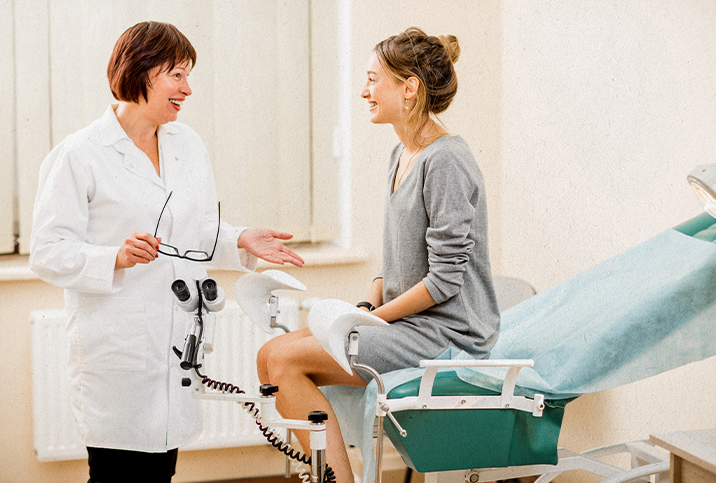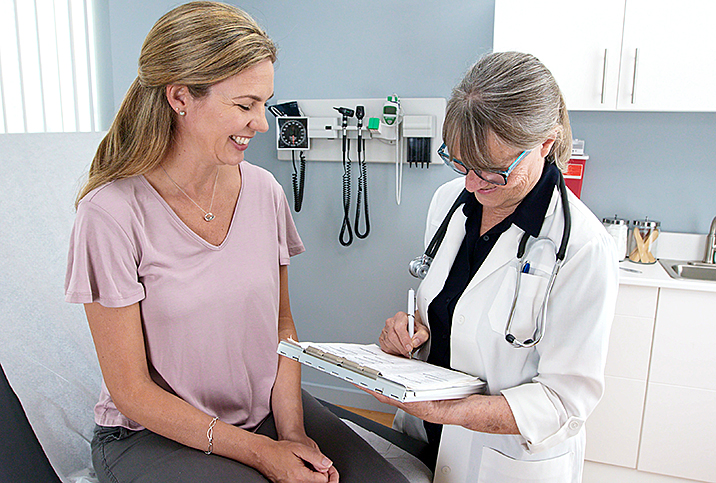Tips for Your First Gynecologist Visit—Alone

As a young woman, you pass many milestones as you understand more about your sexual and reproductive health. One imperative point along the journey is your early trips to the gynecologist.
However, as you enter adulthood, eventually you must gather the courage to venture to the gynecologist on your own, without the guiding force of a parent or caregiver. It can be daunting to establish a relationship with any medical practitioner—especially one who has intimate knowledge of your body—thus, it's important to ensure you get it right.
Where do I start?
Among the volume of gynecologists to choose from, your choice should depend on individual needs and concerns. Personal testimonies are a strong starting point, recommended both Alex Polyakov, M.B.B.S., senior clinical lecturer at the University of Melbourne and clinical director at the Royal Women's Hospital in Australia, and Erica Montes, M.D., a board-certified OB-GYN in Phoenix and founder of the Modern Mujer health blog and platform.
"Talking to parents, relatives or friends would be a good start; usually, family members will have recommendations," Polyakov said.
Montes added community recommendations to the list. One vital factor is credibility. Though both experts mentioned online testimonies, they also warned of avoiding potentially inaccurate information from unverified sources.
"While I've heard from some women that social media and the internet have helped create more awareness and foster conversation on sexual and reproductive health, I encourage you to speak with a doctor to ensure you're receiving factual information," Montes advised.
However, not everyone has people in their lives with whom they're comfortable engaging in personal discussions. According to Montes, parents and caregivers in particular necessitate open communication to find the best doctor because the topics are sensitive.
As for when to make an appointment, Montes encouraged doing so freely.
"You can make an appointment with a gynecologist at any time," Montes said. "Examples of moments you might consider include if you have a question or concern that needs to be addressed, if you're considering starting or switching birth control methods or if you're beginning a new life chapter like college, a gap year or something else entirely."
For college students, university health centers on campus provide accessible, accredited care, though certain contraceptives aren't always available. In these circumstances, you can locate other professionals in the area or try telehealth options. According to Polyakov, some people can make appointments before adulthood, given they possess the maturity necessary to communicate openly and honestly. The usual recommendation is that they should be accompanied at first.
"One of the things that may be of benefit is to take a friend," Polyakov explained. "As far as I am aware, most doctors would be OK if you brought a support person. It can be a girlfriend, a boyfriend or whomever that you trust and are happy to discuss confidential medical information in front of. That's very important, because if you bring a person and you can't discuss certain things in front of them, then it becomes counterproductive."
From that point on, you can branch off on your own, he said.
You're at the appointment
Once you've found a doctor and made an appointment, you'll need to cover various bases. According to Polyakov and Montes, your specialist asks a series of questions, usually related to past medical and surgical history, medications, family history and description of any current problems or symptoms. Sexual orientation and gender identity also come up. As a follow-up, your gynecologist may ask if there is anything else you'd like to discuss that hasn't been covered in those initial questions.
After the introductions are made, Montes mentioned screenings, preventive care and family planning needs, including contraceptives.
"I encourage women to proactively speak with their doctor about their contraceptive options to make sure they understand each option before making a decision," she said. "Other things I consider include effectiveness, safety profile, availability, cost, frequency of administration, and if and when they may want a child, among other things."
Your gynecologist may discuss:
- Condoms: These are best for prevention of sexually transmitted diseases (STDs) and can be used conjointly with other contraception.
- Short-acting contraceptives: These include pills, patches, vaginal rings and injections taken at varying intervals and which can be stopped at any time.
- Long-acting reversible contraception (LARC): These include intrauterine devices (IUDs) and implants inserted and removed by a healthcare provider.
- Permanent options: For example, fallopian tubes can be blocked or removed via surgery.
Polyakov said condoms are particularly crucial for people who are not in monogamous relationships, and choices such as IUDs and more permanent options aren't as common among teens as among adults. He specified several other subjects to cover, including STDs, menstruation and personal issues with anatomy.
Both experts strongly asserted the significance of good rapport and honesty with your gynecologist.
"Doctors are obviously trained to be approachable and discuss sensitive topics, but as a patient, you also have some degree of responsibility to actually provide all the information that is necessary for a specialist to give valid advice," Polyakov added.
If at first, you don't succeed…
For LGBTQIA+ individuals, it is especially important to have a sex-positive practitioner. For instance, a lesbian would have less emphasis on contraception compared with a heterosexual, though the experts explained that most procedures, such as Pap smears, are routine for all women and are not orientation-related.
But each patient is unique, and gynecologists require objectivity. Polyakov emphasized it's important to not allow his opinion to affect how he treats someone. It may be wise to seek another doctor if you find them to be judgmental or you decide you're incompatible.
Preventive testing and diagnostic exams are performed in a gynecologist's office. Even with no issues, your calendar should include an annual wellness exam because there could be something dangerous lurking beneath the surface, such as cancers or dormant STDs. An early warning can often mean quicker treatment.
During your annual visit, the doctor examines the breasts and pelvic area. They also screen for cervical cancer by performing a Pap smear, in which a speculum is used to hold the vagina open to view the cervix and a small sample of cells is taken to a lab for testing.
When you take care of your gynecological health and have a connection with your gynecologist, you're ready to take action if problems arise.
"People often suffer in silence," Polyakov said. "If there are any concerns related to gynecological health, they should address them sooner rather than later because that reduces suffering."



















